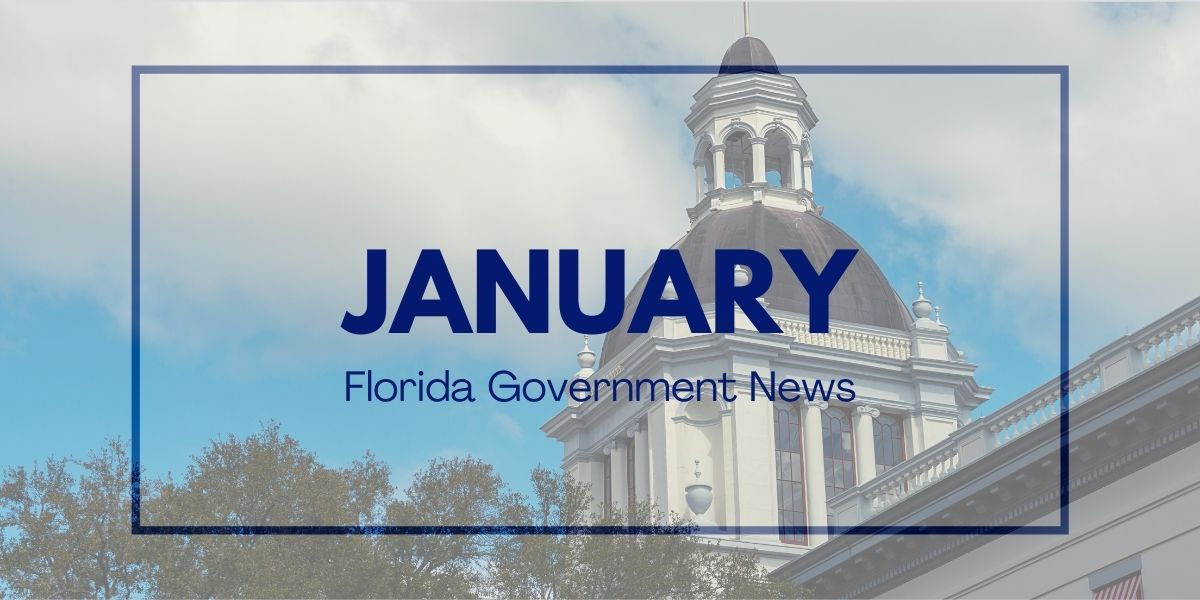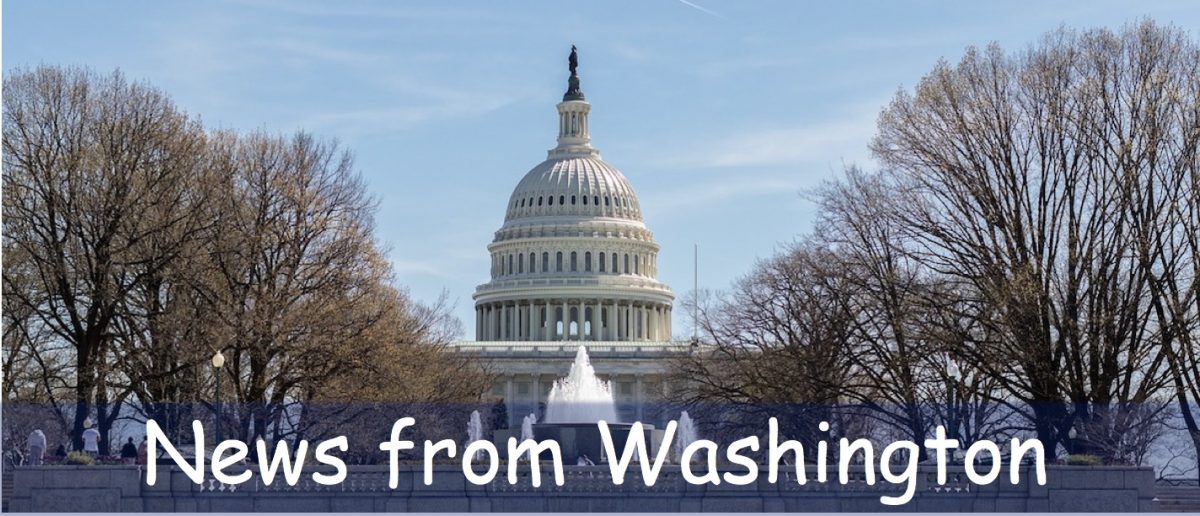
This month, members of the Florida legislature began pre-session committee hearings on proposed bills. The 60-day session will officially begin March 2. In this post, I highlight January’s news from the state capitol.
The Legislature’s Sole Responsibility: Passing a Balanced Budget
With the pandemic wreaking havoc on the state’s economy and the future uncertain, reaching agreement on the revenue assumptions to be used in developing the state budget this year presents a particular challenge. Gov. DeSantis wanted a more-optimistic presumption than the experts proposed. Ultimately, they split the difference.
- After day two of fiery debate, budget experts tick revenue estimates up $1.5B. Florida Politics, 12/21/20
Short of raising taxes, sources of new revenue are few. But Florida is one of seven states that do not require online sellers to collect and remit the state’s sales tax. And it is the only state that hasn’t changed its online sales tax collection laws following a 2018 U.S. Supreme Court ruling that allows states to make sales tax remittance compulsory. Now, in an effort to shore up state revenue:
- Facing $2.7B budget shortfall, Florida lawmakers again will ponder ‘e-fairness’ legislation. The Center Square | Florida, 12/1/20
Senate President Wilton Simpson supports the move.
Among other ideas under consideration, Simpson also floated the idea of signing a new compact with the Seminole Tribe to produce more revenue from gambling (backstory):
- Florida leaders look for revenue (but don’t call them tax hikes) to fill $2.7B budget hole. Orlando Sentinel, 12/1/20
Even if both those measures pass, major cuts will be needed to account for the shortfall. Since more than two-thirds of Florida’s budget goes to education and health care, it is likely that much of them would fall on schools and health care programs.
Late in the month, Gov. DeSantis released a “rosier-than-expected” $96.6 billion FY 2021-22 budget proposal. Its $4.3 billion increase over the current year’s budget is made possible by assuming $4.5 billion in federal COVID-relief money, a state economy buoyed by federal stimulus checks, and $17 billion in federal unemployment payments to jobless Floridians.
- DeSantis’ budget proposal goes up by billions despite impact of the pandemic. Herald/Times Tallahassee Bureau, 1/28/21
- DeSantis proposes $1 billion over four years to help local governments adapt to climate change. Miami Herald, 1/28/21
- DeSantis’ budget would add $286M in K-12 spending. Florida Politics, 1/21/19
- DeSantis’s budget calls for more than $420M for affordable housing. Florida Politics, 1/28/21
DeSantis’ proposal is advisory only. The Legislature is responsible for passing a balanced budget, and it has until the end of session on April 30 to do so. Still, the document is a clear statement of the Governor’s priorities and not to be ignored.
Making Public Policy: Proposed New Laws
COVID-19 Liability Protection
One of the first and perhaps most important bills to be considered this session is a tort reform bill to protect businesses against COVID-19-related lawsuits. A Florida Tax Watch research report titled The Best Defense Is a Good Offense: The Economic Impact of Protecting Responsible Floridians From COVID-Related Civil Liability concludes that “if employers’ confidence in the economy is shaken due to the absence of a liability shield, we would reduce the Florida economy by as much as $27.6 billion and more than 356,000 jobs annually.”
HB 7: Civil Liability for Damages Relating to COVID-19 provides requirements for civil action based on a COVID-19-related claim; provides that the plaintiff has the burden of proof in such action; provides a statute of limitations; and provides retroactive applicability.
- Legislative leaders show support for limits on COVID-19 lawsuits. News Service of Florida via WUSF Public Media, 11/18/20
That said, the devil is in the details. To date, the long-term care industry accounts for more than one-third of the more than 26,000 (as of 02/02/21) coronavirus-related deaths in the state, and:
- Florida House, Senate differ on COVID-19 liability protections for health care providers. Politico Florida, 1/6/21
The Governor’s “Anti-Mob” Bill
In response to police brutality protests after the death of George Floyd last May, Gov. DeSantis proposed what he called the “strongest pro-law enforcement, anti-rioting, anti-looting legislation anywhere in the country.”
- DeSantis’ ‘anti-mob’ bill would extend Stand Your Ground lethal defense to criminal mischief, property crimes. The Center Square | Florida, 11/11/20
The DeSantis bill was filed on January 6 in both chambers with the title “Combating Public Disorder” as HB 1 and SB 484.
- Gov. DeSantis ‘anti-riot’ plan does more than crack down on mob violence. Here’s what it would change. Orlando Sentinel, 1/15/21
- Florida House panel backs bill targeting violent protesters after fierce debate. News Service of Florida via News Service of Florida, 1/28/21
Another Priority of the Governor
“We need to really think deeply about if we are a disfavored class based on our principles, based on having conservative views, based on being a Christian, based on whatever you can say that is not favored in Silicon Valley,” DeSantis said. “I think it’s probably the most important legislative issue that we’re going to have to get right this year and next year.”
- DeSantis’ top legislative priority: Stopping censorship of conservatives online. Tampa Bay Times, 1/14/21
Doing More for Supporters of School Choice
A sweeping school choice bill would expand eligibility for Florida’s school-voucher programs, consolidate five existing school-voucher programs into two programs, and allow parents to use taxpayer-backed education savings accounts for private schools and other costs.
- Florida Senate releases sweeping school choice proposal. WFSU News, 1/23/21; SB 48
About That $15 Minimum Wage …
In November, Florida voters overwhelming approved an amendment to the state constitution to raise the minimum wage to $15 per hour by 2026. Now:
- Florida lawmaker seeks to limit $15 minimum wage approved by voters with ‘training pay’. Orlando Sentinel, 1/28/21; SJR 854
Abortion; Medicaid Expansion; Vaccines; Guns
As every year, there will be many social policy-related bills introduced in the Legislature this session, and most will not make it to the floor for a vote. These bills that made the news this month are of note:
- Legislation banning abortion after 5 months in the works. Florida Politics, 1/13/21; not yet filed but part of a nationwide effort, both in individual states and in Congress (see below: Rick Scott)
- Controversial parental rights bill refiled for 2021. Florida Politics, 1/13/21; HB 241; similar SB 582
- Amid COVID-19 pandemic, Democratic lawmakers mount another attempt to expand Medicaid. Florida Politics, 1/23/21; SB 698; HB 341
- Bill would strip Florida Surgeon General of power to order mandatory vaccines. Tallahassee Democrat, 11/30/20; HB 6003
- Opponents stand their ground as guns on campus legislation filed in Florida. WFSU, 12/7/20; HB 6001
Executive Branch
Since we Floridians elect not only the governor but also the three independent Cabinet members that together make up the Executive Branch of state government, it is important to keep an eye of what each of them is doing. (See my post Who’s Running for State Cabinet in the August Primaries?) Some news of note this month:
Attorney General Ashley Moody
- Moody files brief supporting Texas suit seeking to invalidate election results. Florida Politics, 12/9/20
- Florida joins states in lawsuit targeting Facebook. CBS Miami, 12/9/20
- Moody backs work requirements for Medicaid. News Service of Florida via Tampa Bay Times, 1/29/21
Chief Financial Officer Jimmy Patronis
- Patronis to FEMA: Utility workers need COVID-19 vaccine before hurricane season. Florida Politics, 12/15/20
- Patronis statement on top credit agencies reaffirming Florida’s AAA credit rating amid COVID-19. Press Release, 1/7/21
- Experts question Florida CFO bid to host 2021 Summer Olympics: ‘Mind-bogglingly stupid’. HuffPost, 1/25/21
Commissioner of Agriculture Nikki Fried
- Commissioner Nikki Fried & Office of Energy release Florida Electric Vehicle Roadmap. Florida Trend, 1/5/21
- Opinion: Forging the future of the Florida Democratic Party. By Nikki Fried via Florida Politics, 1/8/21
- Water management district suing owners of dig site criticized by Nikki Fried. Daily Commercial, 2/1/21
Judicial Branch
While Florida’s appeals court justices and judges are initially appointed by the governor, their initial term of office is only extended with the approval of a majority of voters every six years. See my post On the Ballot: Merit Retention of Florida Judges for more information. In the news this month:
- DeSantis appoints Orlando lawyer to appeals court despite criticism. Orlando Sentinel, 12/18/20
- Florida Supreme Court delivers the ‘Holy Grail of lawsuit reform’ in Thursday ruling. News Service of Florida via Miami Herald, 12/31/20
- Appeals court upholds Palm Beach County mask mandate. News Service of Florida via Florida Politics, 1/27/21
About the Environment
- Senate president not a fan of reservoir. News Service of Florida via Cirrus County Chronicle, 12/10/20
- DeSantis calls Everglades reservoir one of the ‘most important restoration projects in history’. News Service of Florida via South Florida Sun Sentinel, 12/21/20
- Rising seas could divert Florida focus, funding from Everglades water quality to tidal flooding. The Center Square | Florida, 12/17/20
- Florida taking wetlands permitting role from federal government; only 3rd state to do so. Florida Times-Union via Naples Daily News, 12/16/20
- After the first one left, will DeSantis hire another Florida climate change leader? Miami Herald, 12/21/20
- South Florida Water Management District discusses Aquifer Storage and Recovery (ASR) wells for Lake Okeechobee project. TCPalm/Treasure Coast Newspapers, 12/22/20
- Florida unveils new statewide sea rise mapping tool. WLRN Public Media, 1/19/21

Senator Rubio
For Marco Rubio’s Senate committee assignments, click HERE.
- Marco Rubio says he will cooperate with Joe Biden, depending on how the President-elect ‘behaves’. Florida Politics, 12/3/20
- Opinion: A Biden Administration must not repeat Obama’s concessions to Cuba’s regime. By U.S. Sen. Marco Rubio via Miami Herald, 12/11/20
- Marco Rubio gets bill empowering State Department do more to fight anti-semitism through Senate. Florida Daily, 12/17/20
- Intel chairman Rubio says ‘America must retaliate’ after massive cyber hack. Miami Herald, 12/20/20
- Sen. Marco Rubio wants Florida to get share of Gulf of Mexico oil lease revenue. Northwest Florida Daily News, 1/26/21
Senator Scott
For Rick Scott’s Senate committee assignments, click HERE.
- ‘We need transparency’: Rick Scott calls for special counsel to probe Hunter Biden matters. Florida Politics, 12/17/20
- Scott takes over GOP Senate fundraising as corporations pull plug on contributions. Orlando Sentinel, 1/11/21
- Rick Scott drills Homeland Security about Joe Biden’s ‘amnesty’ push. Florida Politics, 1/27/21
- Sens. Rick Scott, Lindsey Graham re-introduce ‘Pain-Capable Unborn Child Protection Act’ to Congress. ABC-27/WTXL, 1/28/21
- Fl Senator Rick Scott intends to file bill to “stem the tide of the rampant and unyielding illegal immigration”. WCTV, 1/30/21; Press Release
Key Votes This Month
- Rubio votes yes on federal pandemic relief bill; Scott votes no. The Paradise Progressive, 12/22/20
- Scott, Rubio join Senate majority to override Trump defense bill veto. The Paradise Progressive, 1/1/21
- Scott votes yes on objection to Biden’s presidency; Rubio votes no. Orlando Sentinel, 1/7/21
- Scott, Rubio renew push to extend oil and gas moratorium in eastern Gulf. Northwest Florida Daily News, 1/25/21
- Rubio, Scott decline to lay out legal reasons for opposing Trump impeachment. Tampa Bay Times, 1/29/21
That’s it for Florida government news for January. Stay safe!
